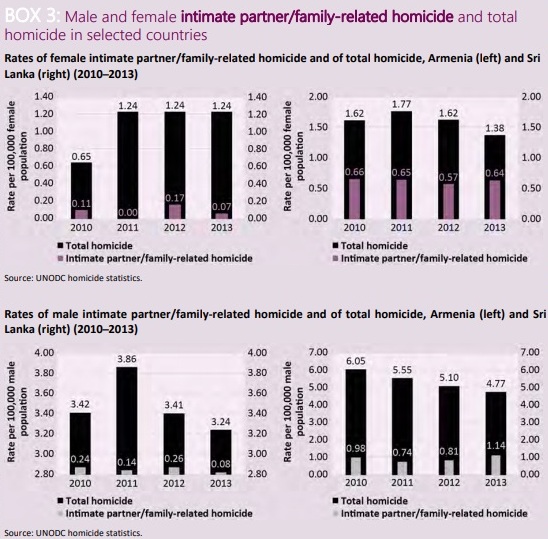 Husband killed wife after 25 years of marriage
Husband killed wife after 25 years of marriage
by Ani Nazaryan
March 2 was a sunny Saturday in Armenia's capital city of Yerevan. A 15-year-old girl, whose family had already suffered tragedy, opened the door after a knock and answered a greeting with a whisper.
Her mother, Narine Danielyan, 38, was killed by her father, Arthur Meliksetyan, 42, in September of 2016. So when she was asked to call her grandmother, she told the visitor to wait and pushed the door shut.
Her grandparents had refused to give an interview. Their son is now in jail for the murder of his wife of 25 years. They now take care of three grandchildren, two girls’ ages 17 and 15 and a 6-year-old boy.
But the family preferred to keep silent and not to talk about the case, only mentioning that the children have grown up, have new friends, and want to have a life without such conversations.
 “It was disaster for my family. I didn’t want to speak about it,” the grandmother said. The grandfather said go write an article how Armenian women should be -- meek and mild, respectful towards their husbands -- for the future prevention of such cases.
“It was disaster for my family. I didn’t want to speak about it,” the grandmother said. The grandfather said go write an article how Armenian women should be -- meek and mild, respectful towards their husbands -- for the future prevention of such cases.
Narine Danielyan’s and Arthur Meliksetyan’s families lived in the same neighborhood near Muratsan Hospital in Yerevan. When she was 14 and he was 18, they ran away from their homes and got married. Karine Danielyan, the victim's sister, said their family was against this decision and her father didn’t accept her back home because this behavior dishonored his name: “At that time my father was working at the Ministry of Internal Affairs, he had dignity and honor, and everybody in our district knew him and respected him.” Karine Danielyan now says that if the family had allowed her sister to come back, she would be alive now. She said the husband loved her sister, “but that kind of love was a relationship between an owner and a slave who should do whatever the owner said.”
Karine says her sister was constantly battered by her husband. In the last days before her murder, she had firmly decided to leave him. Her husband's response was "I will kill you, if you leave me.”
“We always were in touch and we didn’t have any secrets from each other. Narine tried several times to end the marriage and leave with the children, but she didn’t know where to go. A week before the murder she announced she would divorce.
"She told me: 'I can’t no longer stand him, one of us will die.' I responded, 'why should you, let him die.' ” Karine Danielyan said. The victim's children and her in-laws also knew about the beatings.
On September 19, 2016, the spouses drove to the village of Zartonk in Armavir province to buy vegetables from Arthur’s relatives, and also to collect a debt from one of the relatives.
The murder happened on the way back home. According to the Datalex Judiciary Portal, the body of Narine Danielyan, with multiple signs of violence, was found on the Aknalich-Zartonk highway. They had again argued over his jealousy and her denials. First he beat his wife in the car, then took her outside and choked her to death.
In court he argued that it wasn’t premeditated murder. He admitted that he beat her, but claimed she fell into a body of water near the road, and that he tried to pull her out. But forensic experts stated there should be water in the victim’s throat and lungs if it was a drowning, which was not the case.
What happened to Narine shocked neighbors. “She had lived here for three years. She was very polite, a tidy, careful mother with her children. None of us could imagine that such kind a thing would happen,” said 60-year-old Marieta. She said the husband “was a very gloomy and dark person, who did not communicate with others”.
Another neighbor said the husband often went to Russia for work, and was controlling his wife even from that distance: “He wanted to know what was going on in their home, so he forced her to be online and through Skype he followed her actions. She was very dissatisfied with her life. She said she was fed up with all the jealousy and tension with her husband.
"Now she cannot see her children grow up. She cannot care for them and protect them."
Meliksetyan was sentenced to nine years in prison. But after he appealed, the victim's family also filed an appeal. The Appeals Court added another two years to his sentence.
His parents blame Karine Danielyan, saying that there was no need to appeal. Defense lawyer Hamlet Stepanyan said the Meliksetyan seemed satisfied with the first verdict. The lawyer said the victim’s family filed the first appeal, but according to Datalex.am, the Appeals Court received the Meliksetyan 's appeal from Stepanyan on November 29, 2017, and the appeal from family lawyer Seda Safaryan on December 4.
Safaryan said the killer's appeal shows he doesn't accept blame. “So that is why the judge added another two years to his sentence. If he did not appeal, maybe we would not have appealed," she said.
Safaryan has worked on several femicide cases. She says many women die because of their close relatives’ indifference. Sometimes sisters and brothers don't do enough to protect domestic violence victims because they are afraid that if they interfere, the violence will get worse.
From 2010-18 in Armenia there were at least 62 cases when women were killed by their husbands after constant domestic violence. Zaruhi Hovhannisyan, communications and external relations officer for “Coalition On Violence Against Women”, estimated there are 2,000 domestic violence cases in Armenia every year. “As a result of domestic violence, we have at least 10 to 15 homicides per year, the majority of which are women,” she said.
According to a United Nations Office on Drugs and Crime’s global study on homicide, 87,000 women were intentionally killed in 2017. More than half (50,000) were killed by intimate partners or family members, an average of 137 per day.
The global rate of female homicide in 2017 was estimated to be 2.3 per 100,000, and the rate for female intimate partner/family-related homicide rate was estimated at 1.3 per 100,000.

According to the Armenian government Investigative Committee, 519 criminal cases of domestic violence were investigated in 2018 as compared to 458 criminal cases investigated in 2017. Ten of the 2018 cases ended in murder.
Safaryan wants to see laws changed. She said investigators don't keep accurate statistics on beatings and violence, and often don't consider them as aggravating circumstances in a crime.
She believes local authorities and police officers can play a big role in preventing domestic violence and femicide cases: “Through everyday work they should identify vulnerable families, keep in touch with them, and make husbands feel like they are under a microscope."
*photo of Arthur Meliksetyan in courtroom:Epress.am